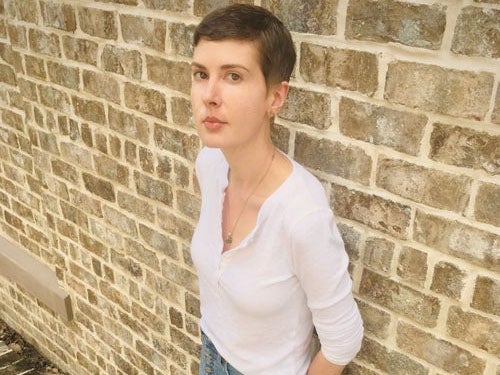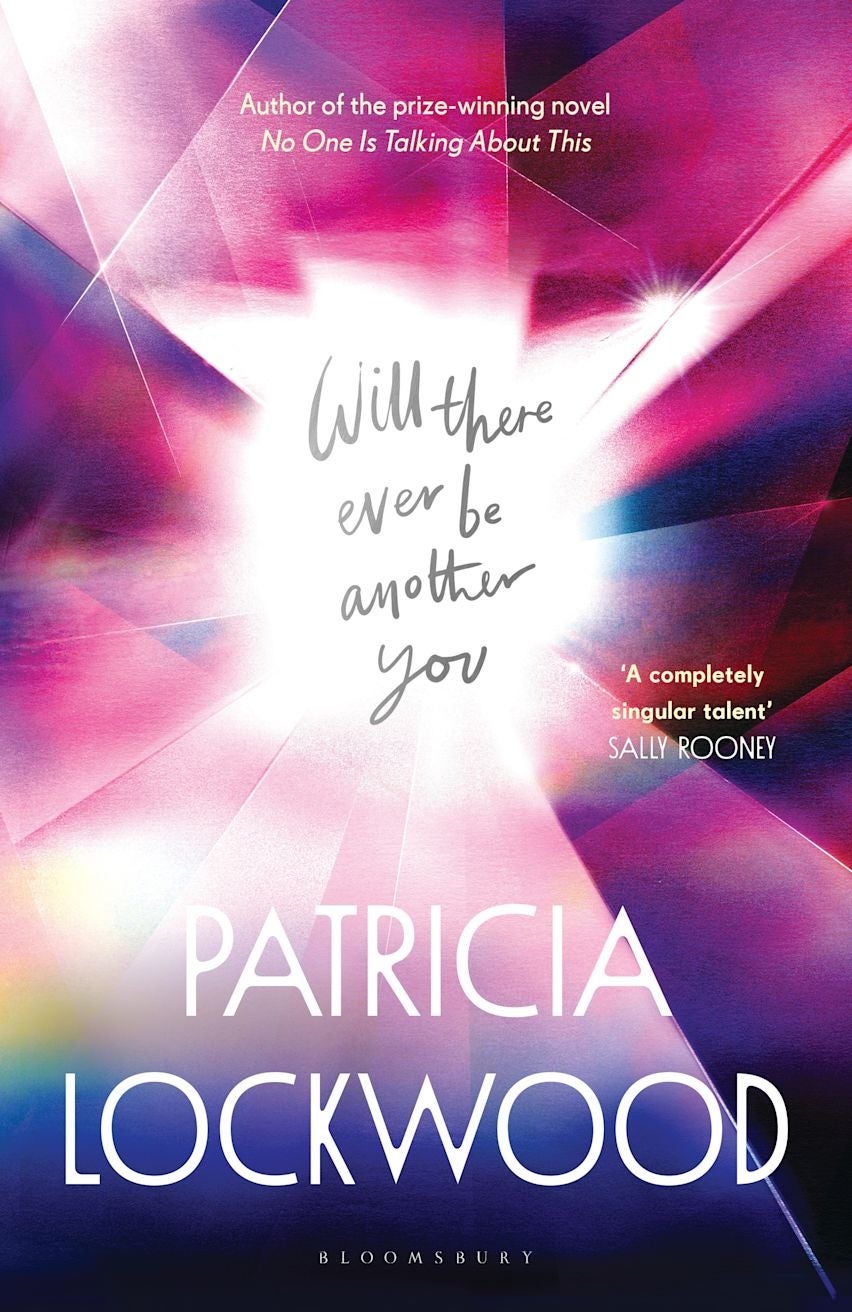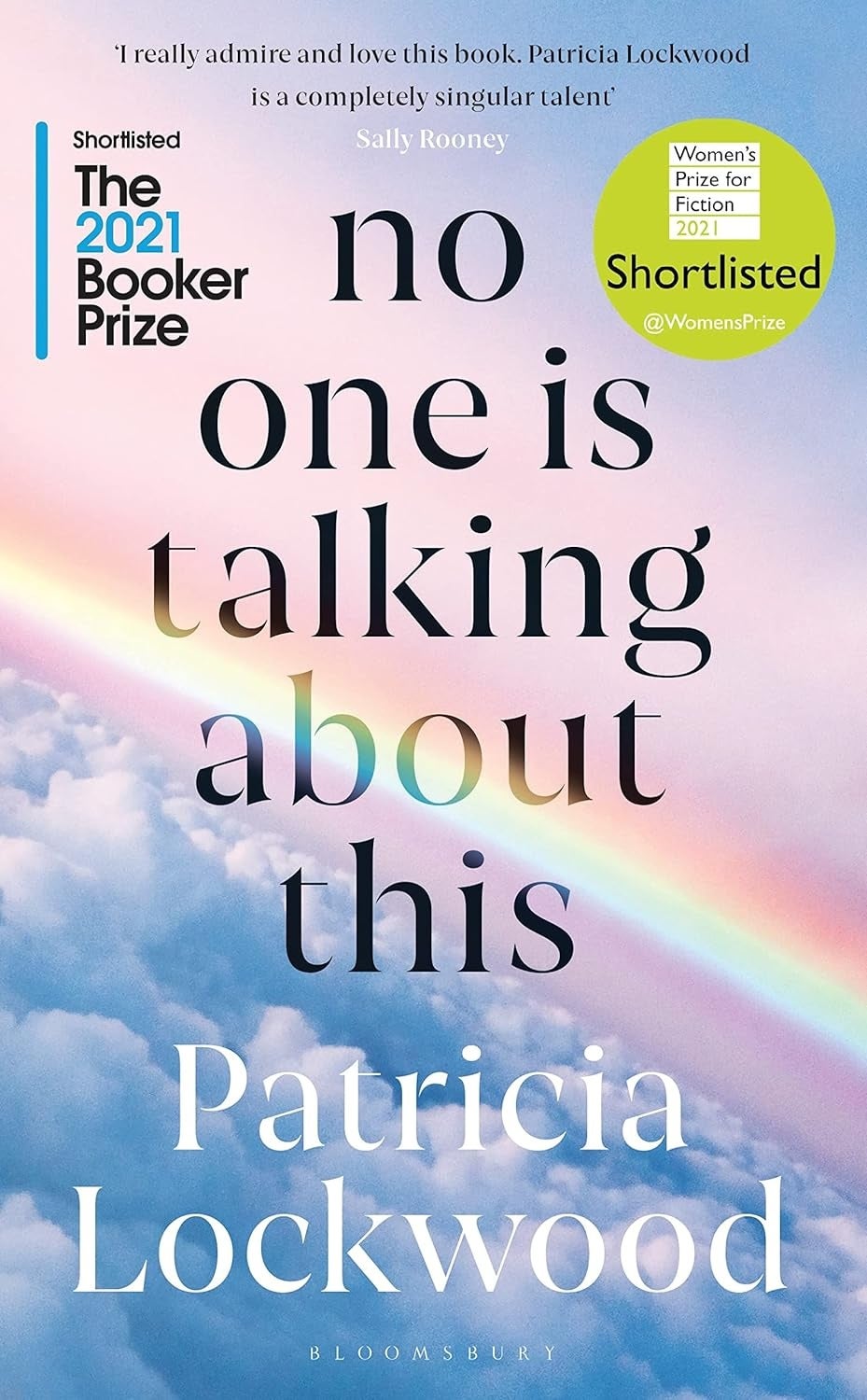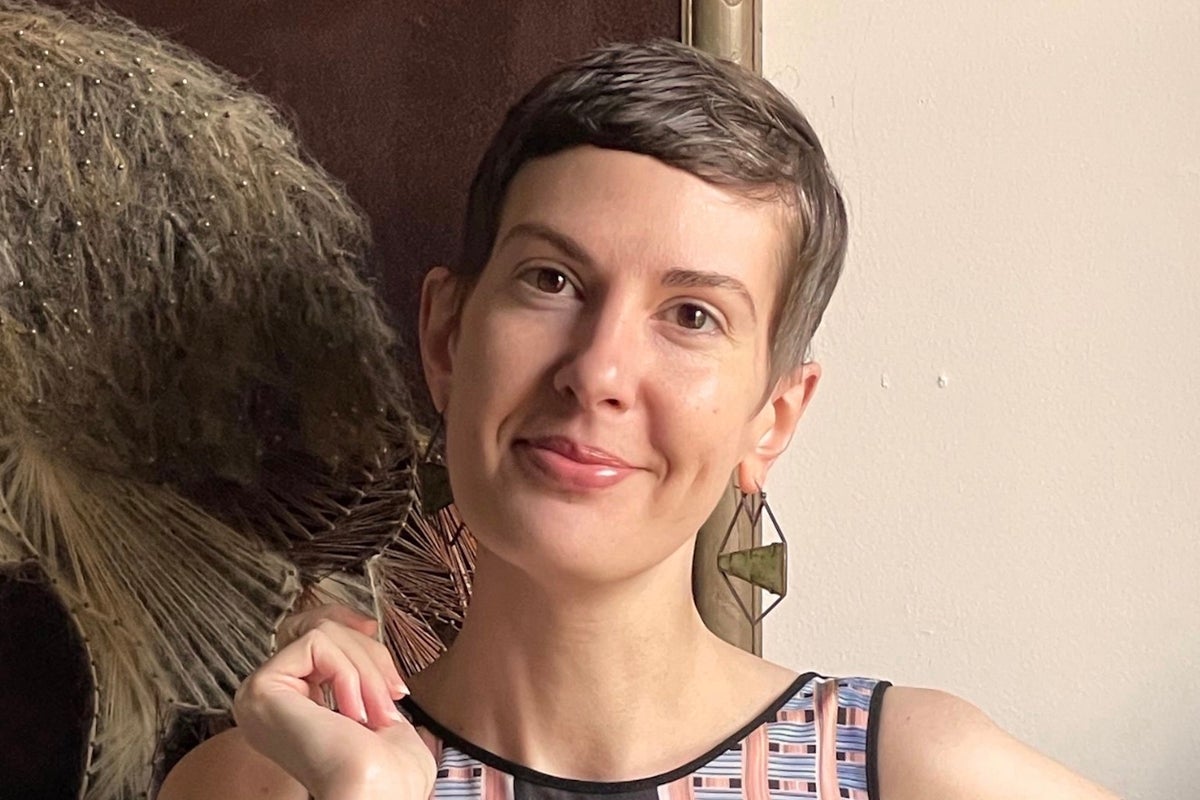Meeting the author Patricia Lockwood is a lot like reading her books: warm and enveloping. Batting my hand away in favour of a hug, she sits down and immediately orders a litre bottle of still water to go with her litre bottle of sparkling. “I need one to just chug,” she explains. When it arrives seconds later, she raises them both to her waiting mouth and mimes guzzling, tongue out, like an aspiring frat bro or a newborn calf. “Double water,” she enthuses, wild-eyed in the bar of a fancy hotel.
At 43, Lockwood is the only author ever to be shortlisted for both the Booker Prize and the Women’s Prize for Fiction. She’s also the only one to have started their career on Twitter, writing exceptional sexts like “I am a Dan Brown novel and you do me in my plot-hole.” If you’re to believe her peers, she’s the voice of her generation. It’s an epithet not without reason: you’d be hard-pressed to find a more sincere portrait of online life than her 2021 novel No One Is Talking About This, or a memoir as screwy and sublime as 2017’s Priestdaddy, which drew from the abnormally rich reservoir of her childhood in the Midwest as the daughter of a guitar-shredding, trouser-hating Catholic priest.
A humorist in the vein of David Sedaris, Lockwood is singular, her antennae tuned to a different frequency than the rest of us. What, then, when those antennae falter? When they snap, suddenly and catastrophically? That is what happened in 2021, when she got Covid and fell into a sort of lunacy. She describes the period as one of mental and physical disorientation that resembled something like a years-long stroke. Her thoughts scrambled into word soup. Her mind loosened from its peel like a slick banana.
Lockwood wrote her new novel, Will There Ever Be Another You, mid-mania. “In the centre of the whirlwind, as I call it,” she says now. “But the whirlwind seemed to have scraps of paper flying in it, and I would snatch one down occasionally.” If writing the book was disorientating, so, too, is reading it. Vignettes arrive without notice and from all directions: a neurologist’s office; a family outing to Schützenfest, the German fair in Cincinnati; a remembered phrase from a poem she forgot she was writing about Laura Ingalls Wilder. Moving from one to the next compulsively, Lockwood is a basement fortune teller on a roll. “It had to feel fragmented as a documentation of experience,” she says now. The dissonance was so extreme, it didn’t even feel like Lockwood herself was writing it. “It was this person standing six inches inside of me.”
Tricksome and ambiguous, the novel is hard work at times – perhaps harder work than Lockwood’s average fan, won over by her more straightforward memoir and smutty tweets, is prepared for. “I wrote Priestdaddy with an audience in mind, because I was selling my crazy family story,” she says. “And childhood is a narrative event, right? I was also packaging it for people to consume and read. When I write for myself, I am very formless! It’s funny, I do what I want.”
The success of Priestdaddy afforded Lockwood some of that freedom, but really, she insists, it was the fact that she’d started out as a poet. “If you’ve already written lyric essays and written fragments, you get to go forth and do what you want,” she says. “And guess what? People don’t mind. They don’t need what everyone thinks they need. It’s not always about accessibility: sometimes people want to not quite understand something. Sometimes people want mystery…” She delivers this last word with a wave of her hands, like a magician disappearing a penny.
Lockwood is a theatrical conversationalist. She puts on funny voices, “Cheers”-ing me through the puckered lips of an aristocrat. She’ll pause mid-sentence to acknowledge a change in music (“AW YEAH”) and pay respect to the lights when they dim for the evening. Online as she is, Lockwood is a delight in person.
As someone whose writing is so bound up in the whims and fancies of the internet, does she ever wonder how her work will hold up decades from now? “You can’t think about it too much,” she says, confessing to having had the “megalomaniacal thought” that people will still be reading her books 1,000 years in the future. “It helps to think that when you’re writing; it helps to think you’re doing something permanent.”

In the case of No One Is Talking About This, set in 2017 at the beginning of Donald Trump’s first presidential term and the beginning of the end for Twitter, she felt the need to get it down on paper. “Someone had to, and it didn’t seem like people were doing it. It’s like ephemera; whatever seems like chaff or bluff now may end up being important,” she says, going on to paint an image that’s not not Lockwood-esque: “I’m a body at Pompeii. I’m all grey and dusty, holding an iPhone – it’s archaeological!”
Her first taste of virality came in 2013 when she published “Rape Joke” in an online magazine, The Awl. She wrote the poem in response to the comedian Daniel Tosh, who’d responded to a woman challenging his rape jokes by saying: “Wouldn’t it be funny if that girl got raped by, like, five guys right now?” At the time, The Guardian said Lockwood had “reinvented the way we talk about rape”. Today, she’s keen to point to all the women writers who have spoken about the subject before her. “You know, Maya Angelou’s I Know Why the Caged Bird Sings,” she says. “But she was a Black female writer. Many of those women wrote about these things on the margins, and they were not considered serious subjects for literature.”
While Lockwood finds it fruitful to draw on her experience for her work (she was raped by a boyfriend at 19), she finds the long leash afforded to her by the “fiction” genre invaluable. “If you call it fiction, you can sometimes put things in that you wouldn’t otherwise,” she says. By comparison, Lockwood was “scrupulous” when it came to Priestdaddy – though it didn’t stop the accusations of exaggeration. “Buh-lieve me, I was underplaying it,” she cackles. “It was way more exaggerated than that. WAY crazier.” Close friends who knew her dad told Lockwood she had soft-pedalled his quirks by approximately 40 per cent.

To the long, booming roster of enigmatic fathers in literature, add Greg Lockwood, who entered the navy a proud atheist and converted to Catholicism hundreds of feet below sea level after watching The Exorcist in a submarine. For a time, Bryan Cranston was being eyed up to play him in a TV adaptation of Priestdaddy, with Betty Gilpin as the lead. Happily, Lockwood says, the series never came to fruition. “Some of those shows last seven years! What was I going to do, call up my mum and just milk her for lines of dialogue?”
There’s a moment in Priestdaddy when her dad informs Lockwood that there isn’t enough money to send her to college. Shortly after, he buys an electric guitar originally made for one of The Beatles. “I was very angry about that for a long time,” Lockwood says now, “but at a certain point I had to admit to myself that I would have gotten to orientation and passed out cold on the floor. I would not have known what to do. I had to come at it another way.”
Still, I wonder how Priestdaddy was received by her family; whether the ripples of revelations surrounding their pro-life placarding and her dad’s tighty-whities made waves at home. “He said he’d never read it, and that I could do what I want,” she says. “It’s a tremendous generosity.” If he did read it, he’d find a portrait of himself that is as compassionate as it is revealing. “I hope it’s never mean-spirited,” she says. “It’s taking the piss – like, what’s a really bad British term?” I play it safe: the c-word. “Exactly. It was never that. I think I call him a bastard, but that’s affectionate.”
Lockwood recently visited her father’s rectory in Kansas City for the first time since the US election. She found a Maga flag hanging outside, and a “LET’S GO BRANDON” mug in the kitchen cabinet. She cringes. “You’re in your seventies; why do you need a meme mug? It’s so strange and childlike. He’s a grown man who does not need to be on YouTube watching videos where men ‘destroy’ Taylor Swift. That is not what anyone needs to be spending their final 10 brain cells looking at. This is not what you want to do with your one precious life.”
Still, Lockwood says, “he’s getting older and older, and he’s experienced physical infirmity. The only thing you can do is just be like, ‘Well, I guess I’m the leftist demon of your nightmares and I’m standing in front of you cleaning up your dog s***, so what do you think about that?’”
A telltale sign that X is over is the fact that Lockwood, who was routinely described as the Poet Laureate of Twitter, has finally packed up and left. Her tussle with the platform when Trump first came to power is explored in No One Is Talking About This, in which the US president is referred to solely as “the dictator”. “I wrote that book at the right time,” Lockwood says now. “And I believe that many of my assertions were borne out. I remember a time when people were like, ‘Who does she mean? ‘The Dictator’… isn’t that a little dramatic?” She raises her eyebrows. “Listen to what he’s saying! Take a person at their word, even when the words are completely scrambled and totally absurd.”

Twitter as she knew it is dead and gone. “Oh my God, those days!” she exclaims. “There was a real connection there.” It was the kind of place where Lockwood felt comfortable sharing a photo of her late niece, Lena, whose death at six months old from Proteus syndrome features regularly in her work. Times have changed. “Some of the funniest people I knew were on there, and it’s f***ed up that now they have to be posting about the Cracker Barrel [political controversy],” she sighs. “Truly ‘the greatest minds of my generation…’ she says, referencing the first line of Allen Ginsberg’s poem about a descent into madness.
Before our time comes to an end, I feel compelled to ask Lockwood about Carlo Acutis, the first millennial saint, who was nicknamed “God’s influencer”. As a subject, he exists at the intersection of Lockwood’s expertise: religion and the internet. “Oh my gosh, yes! It happened right under my nose. He was a guy fragging people in video games back in the day. Now he’s a saint and it’s very surreal, but that’s the landscape – it changes!”
As for how that landscape has changed, Lockwood says, “People in the past may have had more of a personal sense of religion, but in the States, with this movement of mega-churches, they’ve really channelled a lot of that yearning feeling, that searching and healing, into places where it’s about money and prosperity. It’s very far, to me, from that feeling you have sitting in a church, letting your face be bathed in coloured light.”

And what of the hot-girl-ification of Catholicism, the trend for rosary beads and gothic aesthetics? “I went to God’s gang back in the day, and our pants were enormous! And our T-shirts were huge!” Lockwood laughs. “You don’t have to be hot! That was part of the reason it was great, like, this is a place I don’t have to be hot. It’s kind of a refuge, and now you have to be hot, too? Aw, no!”
Lockwood has no desire to rejoin the Church, especially not now. “It would be a weird time to return to the Catholic Church; they have gone haywire over there,” she says. Still, religion, especially the way Lockwood experienced it, is something that sticks with you. “Meeting [Pope] Francis, you feel a little bit of that; it’s still in your body,” she says. “There’s something that is deep inside your body with those rituals.” After all, the Church is where she first experienced beauty. “I was not experiencing beauty at home with submarine novels, but then there was this beautiful stained glass, and this amazing music,” she says. “It’s one of the first places where you feel that heightened sense. But yeah, re-entering it now would be madness. Maybe I’ll start my own sect! Radical nuns on a riverboat!” It’s easy to picture, actually.
‘Will There Ever Be Another You’ is published by Bloomsbury on 23 September



